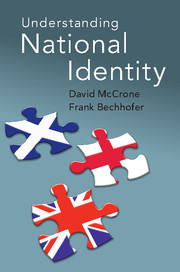Book contents
- Frontmatter
- Contents
- List of tables
- Preface
- Introduction
- 1 Thinking about national identity
- 2 Accessing national identity
- 3 National identity: do people care about it?
- 4 Debatable lands: national identities on the border
- 5 Claiming national identity
- 6 The politics of national identity
- 7 The notional other: ethnicity and national identity
- 8 A manner of speaking: the end of being British?
- 9 Whither national identity?
- Appendix National identity publications
- Bibliography
- Index
9 - Whither national identity?
Published online by Cambridge University Press: 05 April 2015
- Frontmatter
- Contents
- List of tables
- Preface
- Introduction
- 1 Thinking about national identity
- 2 Accessing national identity
- 3 National identity: do people care about it?
- 4 Debatable lands: national identities on the border
- 5 Claiming national identity
- 6 The politics of national identity
- 7 The notional other: ethnicity and national identity
- 8 A manner of speaking: the end of being British?
- 9 Whither national identity?
- Appendix National identity publications
- Bibliography
- Index
Summary
In his classic 1961 paper entitled ‘The oversocialized conception of man in modern sociology’, Dennis Wrong began with the account of the writer Gertrude Stein on her deathbed. She is reported to have muttered: ‘What, then, is the answer?’ ‘Pausing, she raised her head, murmured, “But what is the question?”, and died.’ (1961: 183). Wrong uses the story to make the point that answers are meaningless when separated from the questions:
If we forget the questions, even while remembering the answers, our knowledge of them will subtly deteriorate, becoming rigid, formal, and catechistic as the sense of indeterminacy, of rival possibilities, implied by the very put- ting of the question is lost. (Wrong, 1961: 183)
We shall conclude this final chapter with some speculative remarks about the future of research on national identity. The bulk of the chapter will pull together and expand on previous discussion of two key questions which, together, frame our approach to the study of national identity. First, why is national identity sociologically interesting? We argue that the concept helps us to address some classical questions about the nature of social order. The second question is: why have issues of national identity come to the fore in modern times in the British state? What does this tell us about the relationship between citizenship and ‘nation-ness’, notably in England and Scotland, and about the possible future of territorial relations in these islands? Here, then, are two fundamental questions pertaining to the social and political order which studying national identity can help us address.
Recovering the social
The first of these questions takes us back the classic problem of social order: how is society possible, or, in Dennis Wrong's words: ‘How are men capable of uniting to form enduring societies in the first place?’ Leaving aside his use of the male form, a feature of its time and not ours, this remains arguably the central question in sociology.
- Type
- Chapter
- Information
- Understanding National Identity , pp. 188 - 207Publisher: Cambridge University PressPrint publication year: 2015



